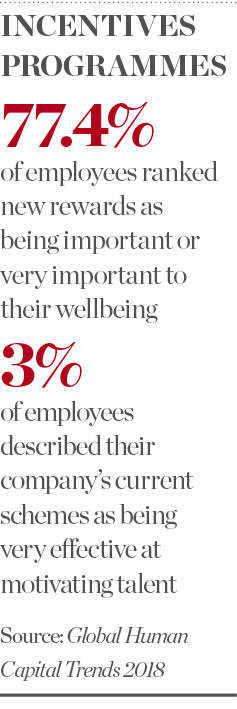
Rewarding and recognising employees for their efforts has long been a strategy utilised by successful leaders. Traditionally, these rewards programmes – often called ‘employee incentives’ – have been aimed at sales teams or departments with clear, quantifiable targets. Such incentives are put in place to motivate teams to reach, and hopefully exceed, their objectives.
Mechanisms that measure success serve to highlight the top performers within particular teams and provide a shining example for other employees. This simple yet age-old process is still adopted by many organisations due to its effectiveness in delivering tangible results, such as increased sales.
More leaders than ever are offering employee incentives to those outside the sales department
In recent years, however, there has been a noticeable shift in how organisations deploy their rewards programmes. Having recognised that similar benefits can be replicated across the workforce, more leaders than ever are offering employee incentives to those outside the sales department. At Penguins, we help businesses deliver rewards programmes of genuine value.
Inside and out
Increased profits resulting from improved sales figures is not the only hard return for businesses employing rewards programmes. A further benefit companies would do well to remember is the impact incentives can have on employee retention, which helps reduce recruitment and training costs. There are also softer returns, including improvements to talent attraction, employee engagement, team morale, corporate culture and employee loyalty. The recognition of these returns has caused a shift in the types of rewards offered.
In HR terms, there are two clear types of reward: intrinsic and extrinsic. Intrinsic rewards are the internal motivators – they are not usually tangible and can come in the form of job satisfaction, role autonomy or praise from managers and colleagues. Extrinsic rewards, meanwhile, are external motivators that usually come in the form of a physical benefit, such as a pay rise or bonus, or as an additional company comfort, such as a car, laptop or health insurance policy.
Historically, rewards have predominantly focused on extrinsic offerings, steered by employee demand. In various organisations, for example, eye-watering bonuses and flashy company cars have driven sales teams to reach higher targets. However, as the perception of rewards within organisations has changed and business leaders have opened the schemes up to all, there has been a distinct transition to a more holistic offering, one that encompasses both intrinsic and extrinsic rewards.
Employee engagement
Businesses have come to understand the importance of social rewards and are taking measures to improve the wellbeing of their people and create healthy, more desirable working environments. One of the ways of achieving this is through effective rewards strategies: according to Deloitte’s 2018 Global Human Capital Trends report, 77.4 percent of respondents ranked ‘new rewards’ as being important or very important to their wellbeing.
Nevertheless, sometimes companies require help delivering the right set of rewards. Many are struggling to move their incentives programmes from a standardised offering to a more personalised one. As a result, just three percent of employees described their company’s current schemes as being very effective at motivating talent.

As one of the leading events agencies and incentive travel firms, Penguins has noticed an increased emphasis on rewards and recognition. Perhaps more importantly, though, we have also witnessed a change in focus, with businesses assigning greater importance to the overall goal of employee engagement.
Having helped businesses effectively communicate key messages to live audiences for the past 30 years, we have recognised a growing demand from corporate clients to build more positive relationships with their people, as well as a greater appetite from employees to be a part of something bigger, rather than simply being another cog in the wheel. Correspondingly, Penguins has seen a significant increase in demand for its incentive travel services – almost 50 percent year on year, in fact.
A journey of discovery
Incentive travel is a method of reward that encompasses both intrinsic and extrinsic values. Like any other method of reward, it can be used to motivate employees to achieve their targeted goals. In particular, Penguins champions the power of group travel. In this format, the successful employees who earn a place on the trip (or all employees, if it is an organisation-wide incentive) embark on an experience together. It is this unity that drives the greatest return for the business.
Peers get the opportunity to bond and share experiences, while also feeling valued. Barriers are removed between traditional workplace hierarchies, as members of staff are able to enjoy being away together and share unforgettable moments. This helps the entire team to appreciate one another in a way that may not be possible in a normal working environment.
The key benefit of the shared experience is that it offers greater longevity: the impact of the trip lasts well beyond the experience itself, creating memories that stay with employees for the rest of their lives. In turn, this inspires others within the business to exceed targets and create their own similar experiences. There is also an opportunity for businesses to widen the impact of the incentive beyond the employee-employer relationship.
Allowing employees to bring a guest on this journey rewards not only the individual, but also the people who support them in their personal lives – those who help them achieve above and beyond their potential at work. With the buy-in from partners and guests, there comes an added emotional connection that shouldn’t be underestimated. This connection encourages employees to ensure they return for future trips, whether it is as a result of meeting and exceeding targets, or becoming more closely aligned with the company’s values.
The benefit of using agencies lies in their ability to create bespoke, once-in-a-lifetime experiences that are planned and delivered by travel experts who take the time to understand the businesses they are working with. It is this knowledge and expertise that adds to the experience, whether it is ensuring that piping hot baths greet guests on their return from a glacier, umbrellas suddenly appear when a tropical storm brews, or simply through building in a contingency for currency fluctuations so unwanted surprises are avoided.
Using an agency also provides peace of mind. Their ground knowledge, awareness of security threats and appreciation of health and safety issues mean that business leaders can sit back, enjoy the trip and focus on building constructive relationships with their team.

